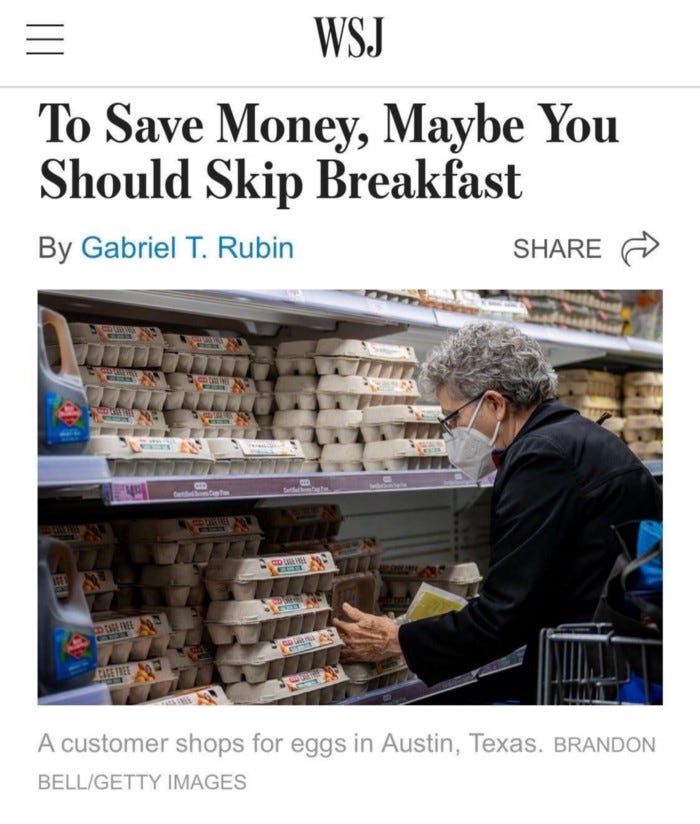The Wall Street Journal Staff Wants You to Skip Breakfast to Save Money
WSJ is wrong. Small things we can do to save money without depriving ourselves of living the little yummy things.
The Wall Street Journal’s new post has gone viral after giving stupid advice about money. It suggests that if you want to have cash in your pocket, then don’t eat for breakfast.
A little bit because of private interest, a little bit because I’m a digital writer, I end up consuming a lot of information about personal finance.
I spend a lot of time at the bookstore every month and invest many hours researching what is being said about it on the internet.
I find a lot of zucchini and a lot of good stuff.
Among the good things I find, the challenge is to sift through what is not more of the same.
Between worrying about money there is a world.
Cutting out breakfast?
Some think that saving on coffee is the secret to their first million dollars, and some don’t mind spending $100 a week at the newsstand.
For some, clothes only serve to cover the body, for others, it makes sense to buy $3000 worth of shoes.
Our challenge is to find our place between the extremes, and to do this we need to understand what is important and what is there just to placate boredom, or just because at one time it made sense and has never been questioned since.
Moreover, we never talk only about money when we talk about money.
Often, talking about money is talking about time, quality of life, availability, mental space, choices, and countless other factors that we deal with every day.
In practice, it works like this.
For some people, carrying a small bottle of water instead of buying it on the street means money and wealth. For others it is absurd.
Some, who think it is nonsense to carry a bottle of water, see it as a good idea to use an app to find the cheapest gas station — even if the saving is less than the bottle.
I usually buy a few gifts, but I like the ritual of choosing one for that occasion, for that person. I prefer to face the situation of arriving somewhere empty-handed, than to arrive with a gift that is good for Tom, Tim, for Amanda, and any other human being.
On the other hand, I am happy when I get a good wine or beer. I put it in the fridge and don’t care if it was bought with me in mind.
If you don’t have much of a beard, you don’t need to buy shaving cream. Just use the conditioner. Another stupid piece of advice I read.
Don’t do this, my son, my god, how absurd, and lastly, don’t shave.
Recently I discovered that the world of shampoos and conditioners is a complex one. There are precious little bottles that cost over $100, and there is junk that should not even be sold.
I have always oscillated between washing with soap or $5 shampoo, not because I want to save money, but out of ignorance. Currently, I have found a middle ground that has made me like my hair curly. That’s $30 well spent, in my opinion.
A common point, which always comes up among the girls, is the manicure. I am writing this text sitting in a coffee shop and I asked 3 women how much they spent each time they went for a manicure. One said $15, one said 20, and one said 35. The girl who pays 35 lives in the same area as the girl who pays 20. They exchanged contacts.
I drive a used car. I use economy speed.
This is a widespread movement: since we opt for the car, which is the expensive option, we stick our feet in the sand and despise all the ways to spend less. It is possible to benefit from the comfort of the car without spending so much.
The same happens with our food.
It is pretty common to make fun of someone who orders a greasy snack and juice. It’s only worth the joke since rationally the mockery doesn’t make sense. Between ordering a greasy snack and a soft drink and a greasy snack and juice, the second option does much less harm.
The idea here is not to judge or to seek consistency.
Speaking of personal finances, there are many things we can cut without having to cut breakfast.
For God’s sake, don’t follow money advice out there. Don’t listen to the WSJ. Worry about living well.


